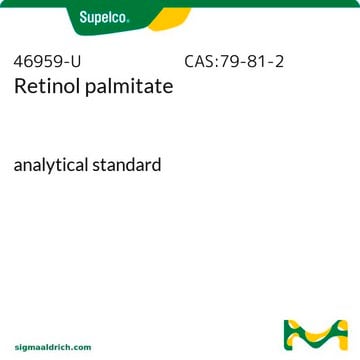R3375
Retinyl palmitate
Type IV, ~1,800,000 USP units/g, oil
Synonym(s):
Vitamin A palmitate, all−trans−Retinol palmitate
About This Item
Recommended Products
biological source
synthetic (organic)
Quality Level
type
Type IV
Assay
≥90% (HPLC)
form
oil
specific activity
~1,800,000 USP units/g
color
yellow to orange
mp
26 °C
storage temp.
2-8°C
SMILES string
CC1=C(/C=C/C(C)=C/C=C/C(C)=C/COC(CCCCCCCCCCCCCCC)=O)C(C)(C)CCC1
InChI
1S/C36H60O2/c1-7-8-9-10-11-12-13-14-15-16-17-18-19-25-35(37)38-30-28-32(3)23-20-22-31(2)26-27-34-33(4)24-21-29-36(34,5)6/h20,22-23,26-28H,7-19,21,24-25,29-30H2,1-6H3/b23-20+,27-26+,31-22+,32-28+
InChI key
VYGQUTWHTHXGQB-FFHKNEKCSA-N
Looking for similar products? Visit Product Comparison Guide
General description
Application
- a retinoid derivative to modulate expression of connexin Cx26 and Cx30 in the cochlea
- a standard in high performance liquid chromatography(HPLC)
- as a retinoid substrate in the isomerase assay of eyecup protein homogenates
Biochem/physiol Actions
Packaging
Physical form
Signal Word
Danger
Hazard Statements
Precautionary Statements
Hazard Classifications
Aquatic Chronic 3 - Repr. 1B
Storage Class Code
6.1C - Combustible acute toxic Cat.3 / toxic compounds or compounds which causing chronic effects
WGK
WGK 2
Flash Point(F)
No data available
Flash Point(C)
No data available
Personal Protective Equipment
Certificates of Analysis (COA)
Search for Certificates of Analysis (COA) by entering the products Lot/Batch Number. Lot and Batch Numbers can be found on a product’s label following the words ‘Lot’ or ‘Batch’.
Already Own This Product?
Find documentation for the products that you have recently purchased in the Document Library.
Customers Also Viewed
Our team of scientists has experience in all areas of research including Life Science, Material Science, Chemical Synthesis, Chromatography, Analytical and many others.
Contact Technical Service







